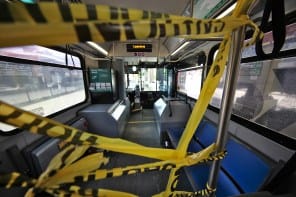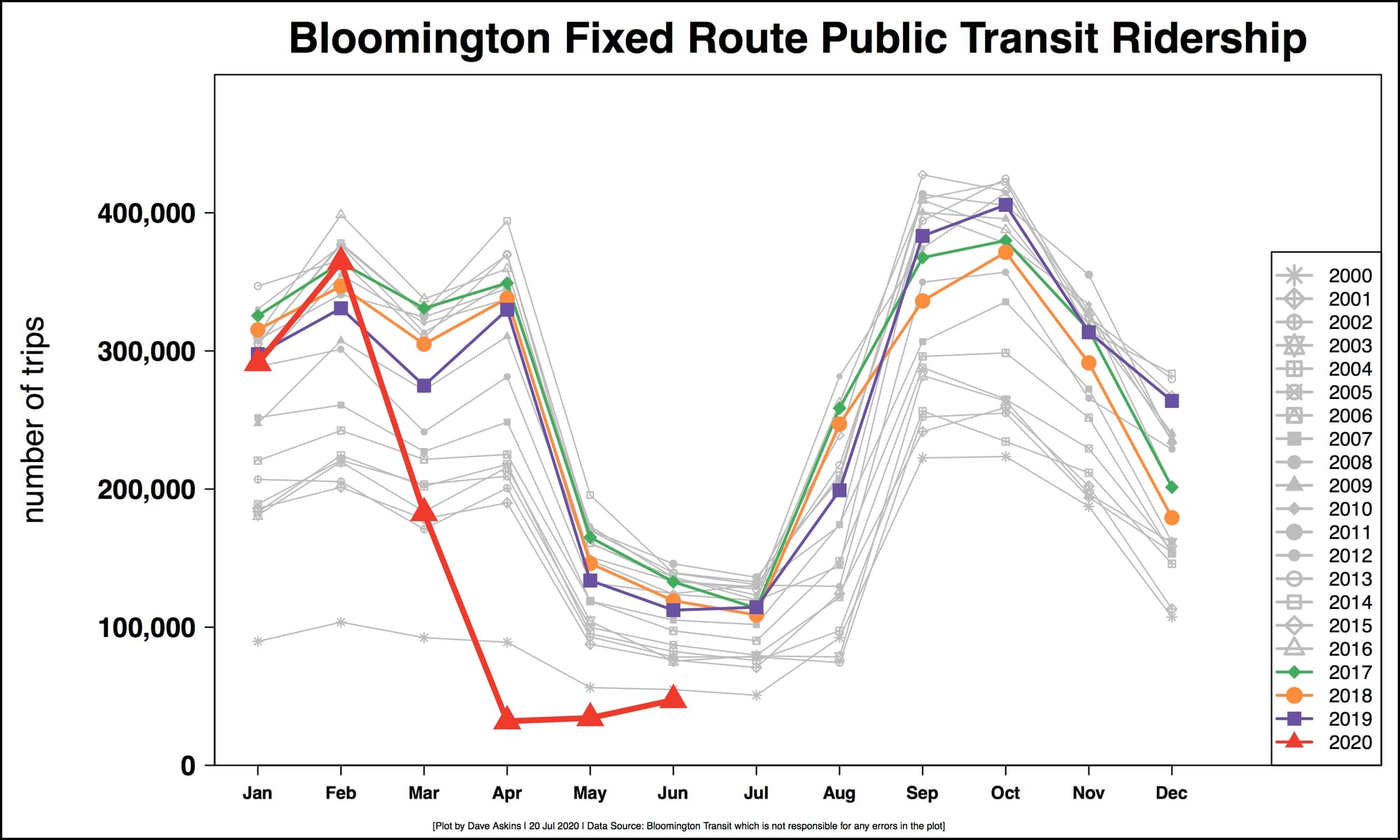Bloomington public buses roll fare-free through COVID-19 towards fall, with Uber as backup plan, same general manager in driver’s seat




Lew May will be staying on board for another year as general manager of Bloomington Transit.
The five-member board expressed relief at the news at their meeting on Tuesday night—May has been contemplating retirement.
Board member Kent McDaniel said, “We’re lucky to have Lew and I’m glad he’s willing to stay for another year.” The board approved May’s contract extension on a unanimous vote.
May gave two reasons he wants to stay on. First, he wants to stay on through the implementation of the planned new routes, originally scheduled for this fall, but delayed due to uncertainty caused by the COVID-19 pandemic. Second he wants to get Bloomington Transit back on its feet after the pandemic. “To me those are two important things that I would not like to just hand off to the next manager,” May said.
Much of Tuesday’s meeting was focused on various issues related to the COVID-19 pandemic. A maintenance staffer tested positive for COVID-19, the city announced in a press issued last week.
No additional employees have tested positive, according to May. But as a contingency, the board authorized the eventual signing of a contract with Uber. Under that contract, Uber would provide transportation service, if so many drivers test positive that the BT bus fleet can’t be operated.
Amid uncertainty about the number of Indiana University students who’ll be returning to campus and where they’ll live, the board OK’d an addendum to BT’s current contract with IU to get through July and August. That’s an alternative to trying to negotiate the renewal of the contract for the whole year, which would typically be done around now. About 70 percent of BT’s ridership typically comes from IU affiliates.
The board also green-lighted a return to service levels that are close to normal, starting Aug. 24. That’s when the time-and-half hazard pay will end for drivers and front-door boarding will start again. All riders will continue to board fare-free.
General manager stays on
Bloomington Transit doesn’t employ its general manager directly. Instead, BT contracts for management services with a third-party transit corporation, which is RATP Dev.
So the item on the agenda for the board’s consideration Tuesday night wasn’t a contract with Lew May, but rather one with RATP Dev. The board approved a one-year extension of the current contract at $14,650 a month, with a 1.2 percent increase to $14,825 a month.
May has served as general manager for Bloomington’s public transpiration system for more than two decades.
With May’s retirement still in the near future, the board was keen Tuesday night start thinking about whether to continue to contract with RATP Dev for management services, or to hire a manger directly. A representative from RATP Dev attended the meeting to say that RATP Dev was still interested in providing the service contract.
BT board chair Nancy Obermeyer will be forming a committee, including some people outside of BT, to explore the question of how to fill the vacancy that May will eventually leave.
COVID-19 countermeasures: Some continue, some not
With the imposition of state and local face-covering requirements, Bloomington Transit drivers will be providing masks to passengers who aren’t wearing one when they board.
According to general manager Lew May, BT has several thousand masks on hand, that were sent by the Federal Transit Administration.
But May said, “If somebody refuses to wear a mask, we’ll go ahead and let them on the bus. We’re not going to engage in conflict or argument. We’re not going to call the police. In fact, the police have told us not to call them for mask enforcement.”
BPD chief Mike Diekhoff confirmed to The Square Beacon that, “At this time, there is no plan for BPD to be the lead on mask enforcement.”
One reason that drivers will be able to distribute masks is that starting Aug. 24, passengers will start boarding through the front doors again. At the end of March, BT had implemented fare-free, rear-door boarding for all passengers.
BT will maintain fare-free boarding. The return to front-door boarding is based on a need to use the whole capacity of the bus, with expected increased ridership from Indiana University affiliates. During the rear-door boarding period, the front one-third of buses has been cordoned off with yellow caution tape to maintain distance between passengers and the driver.
May said that plexiglass shields are planned to be installed around the driver area to create a kind of compartment. There’ll be a hinged piece of plexiglass with a magnetic stop, that drivers will use to get access to their seats.
The return to normal service hours also means more hours of work per week for drivers, and an end to the time-and-a-half hazard pay they have been receiving. May said at Tuesday’s board meeting that the hazard pay was intended to make drivers “whole,” when they were not able to work a full schedule because of the curtailed service hours.
Asked about the union’s reaction to the end of hazard pay, May said, “There’s no comment, I guess, is the best way to describe it.” He added, “They didn’t voice any major concerns.”
The proposed operational plan green-lighted by the board on Tuesday includes continued closure to the public of downtown transit center lobby and the public restrooms. Outdoor portable restrooms will continue to be provided. BT’s Grimes Lane facility, where the administrative offices are housed, will continue to be closed to the public. Administrative and management employees will continue to work remotely, May said.
Indiana University contract addendum
About 70 percent of BT’s ridership is by Indiana University affiliates—who are able to board the bus just by showing an IU identification card, without paying a fare. The current contract calls for IU to pay BT $86,000 a month, or just over $1 million a year.
On the board’s agenda was an addendum to the current contract that covers the month of July and most of August. The addendum prorates the normal payment by the reduced service that BT is providing. That puts the payment around $61,120, according to May.
Starting in September, when the two sides have a better handle on the amount of transportation service that students, faculty and staff will require, the negotiations for the contract for the rest of the year will start.
May said the addendum has a requirement that if university is going to significantly cut the amount of transportation revenue, at least 35 days notice will be given. That’s because BT has have obligations to the public, based on its own policies, May said. If service is going to be cut significantly, 30 days notice has to be given to the public and a public hearing has to be held, May said.
Uber as backstop
On the BT board’s agenda Tuesday night was a contract with Uber to provide transportation service, in case so many of BT drivers test positive for COVID-19 that BT can’t operate its fleet to provide transportation service.
The board didn’t approve the contract Tuesday, but authorized the board chair to sign it, once it the necessary waiver is obtained from the Federal Transit Authority. May that the waiver is related to procurement and drug and alcohol testing requirements.
The lack of an explicit effective date of the contract led to some back and forth among board members. That resulted in their approval not of the contract, but an authorization of their board chair to sign it.
There was enough concern about the arrangement that Kent McDaniel voted against the proposal and Nancy Obermeyer abstained.
Highlights of the deal include the payment by BT to Uber for individual fares up to $15. Any fare amount above $15 would be be paid by the passenger. The service would be available Monday through Saturday from 7 a.m. to 7 p.m. All trips would have to start and end inside the city limits of Bloomington
The contract includes a ceiling—the total payments can’t exceed $250,000.
May told the board that Uber doesn’t have any accessible vehicles in Bloomington, of the kind that can accommodate wheelchairs—and can’t provide any. That means BT would still have an obligation to provide transportation service to people who use wheelchairs, or other mobility devices, May said.
May told the board that the BT’s approach to meeting its obligation to provide accessible service, if it has to resort to Uber’s service, would be to keep a handful employees on duty every day, including a dispatcher. They could be contacted by phone by somebody in a wheelchair or a mobility device to book a trip on one of BT’s accessible vehicles, May said.




Comments ()